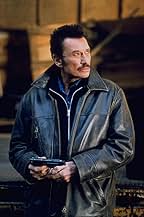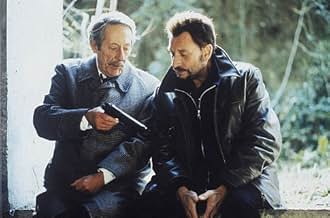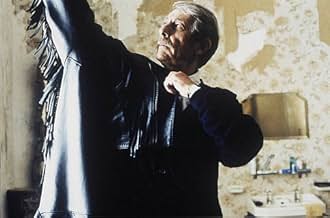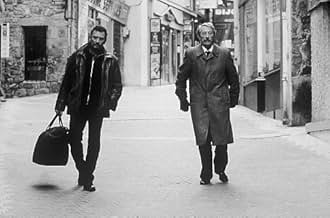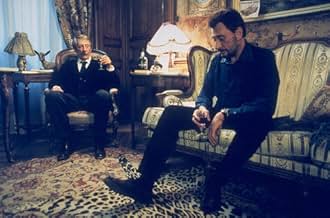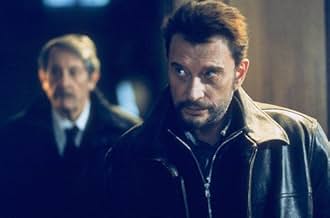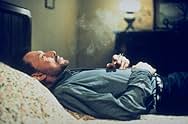AVALIAÇÃO DA IMDb
7,1/10
7,7 mil
SUA AVALIAÇÃO
Um homem desce de um trem em um vilarejo francês, esperando o dia em que roubará o banco da cidade. Ele conhece uma professora de poesia aposentada e começará uma estranha amizade.Um homem desce de um trem em um vilarejo francês, esperando o dia em que roubará o banco da cidade. Ele conhece uma professora de poesia aposentada e começará uma estranha amizade.Um homem desce de um trem em um vilarejo francês, esperando o dia em que roubará o banco da cidade. Ele conhece uma professora de poesia aposentada e começará uma estranha amizade.
- Direção
- Roteirista
- Artistas
- Prêmios
- 8 vitórias e 10 indicações no total
Avaliações em destaque
We know this film from childhood, but the child has grown. Here we are in a provincial French city when the cowboy rides in on the iron train to transform the life of a citizen, unexpectedly, profoundly.
Jean Rochefort, with his great face of character, about to go for major surgery, a three vessel bypass, a wifeless man of regrets, a retired teacher of literature to secondary students, is about to meet his fantasy: Johnny Hollyday (the Elvis of France?) who plays a bank robber about to perform his retirement job. Meeting by apparent chance, though clearly pre-ordained, the fantasies of the lonely, anxious teacher whose love of poetry might be his most tender trait in an otherwise ruthlessly real view of the world, are set in motion. Hollyday becomes his unexpected guest...the lone hotel is closed for the season...and an excitement comes to Rochefort's life. The man has guns. There is a picture of him looking terribly western in his leather jacket, the enigmatic stranger/cowboy in the mythos of his host. Ah, to be that man, to fire that gun, to live that life of dark adventure.
It goes on to its meaningful end, not told here except to say that the last scene may be an error, a prolongation that was unnecessary and added nothing to the power of the film, nor detracted from the marvelous performance of Rochefort, who can do no wrong with any role, or Hollyday, whose acting turn here is perfect in the Robert Mitchum noir sense, but tinged with an old-world tiredness that is quite moving. All this with fine subsidiary acting, a perfectly murky Simenonoish setting, and Schubert's melancholic sounds. Ah, bon. Tres, tres bon.
Jean Rochefort, with his great face of character, about to go for major surgery, a three vessel bypass, a wifeless man of regrets, a retired teacher of literature to secondary students, is about to meet his fantasy: Johnny Hollyday (the Elvis of France?) who plays a bank robber about to perform his retirement job. Meeting by apparent chance, though clearly pre-ordained, the fantasies of the lonely, anxious teacher whose love of poetry might be his most tender trait in an otherwise ruthlessly real view of the world, are set in motion. Hollyday becomes his unexpected guest...the lone hotel is closed for the season...and an excitement comes to Rochefort's life. The man has guns. There is a picture of him looking terribly western in his leather jacket, the enigmatic stranger/cowboy in the mythos of his host. Ah, to be that man, to fire that gun, to live that life of dark adventure.
It goes on to its meaningful end, not told here except to say that the last scene may be an error, a prolongation that was unnecessary and added nothing to the power of the film, nor detracted from the marvelous performance of Rochefort, who can do no wrong with any role, or Hollyday, whose acting turn here is perfect in the Robert Mitchum noir sense, but tinged with an old-world tiredness that is quite moving. All this with fine subsidiary acting, a perfectly murky Simenonoish setting, and Schubert's melancholic sounds. Ah, bon. Tres, tres bon.
"Man on the train", directed by Patrice Leconte is "intimiste" French cinema at its best. It tells the story of a chance encounter and ensuing friendship between Milan, a gangster who is coming to a small French town to rob a bank and Manesquier, a retired professor of poetry who has lived there his whole life. The two protagonists could not be more different and yet, each one becomes fascinated by the other's life. Soon, Milan tries on slippers and Manesquier is shooting a gun at soda cans. Was Milan's life wasted because he never had the strength to fill his life with the structure he so desires? Was Manesquier's life wasted because he never had the strength to escape the structured life he so loathes? Will they go all the way and actually exchange lives? The movie is extremely well directed and photographed, with grainy blueish colors that support each character's melancholy. The script is tight and leaves room for silent moments which are as important to the story as the dialogue (a concept unknown in Hollywood). Every word has a deeper meaning than its litteral one. In one of the best scenes of the movie, the elegant poetry professor Manesquier puts on Milan's leather jacket and stands in front of the mirror saying in English: "The name is Earp...Wyatt Earp". But in the end, what makes the movie such a gem is the talent of the two lead actors who, like their characters, are such extreme opposites that their screen relationship could easily have ended up devoid of any chemestry. Jean Rochefort is an intellectual and one of France's greatest and most subtle living actors. Johnny Hallyday is the uneducated, over-the-top rock'n roll singer and social icon who has monopolized the #1 spot in French music charts since 1960 and who has been derided by the French intelligentsia ever since. Until the movie, Rochefort himself was no fan of Hallyday, though he likes to say with a grin: "Madame Rochefort, on the other hand...". They have since become friends. It, reportedly, took a lot of effort by Rochefort and Leconte to make Hallyday comfortable enough to act opposite Rochefort whom he saw as a towering icon. They most certainly succeeded since, in the end, it is the surprising subtelty of Hallyday's performance that makes the movie so poignant. Despite the botox injections and the face lifts, his Mount Rushmore face looks like that of a man who has been to hell and back a few hundred times. He has such presence and charisma that you can't take your eyes off him whenever he appears on the screen. Though he plays Milan with a minimalist approach, both in demeanor and delivery, he manages to display the most intense emotions in a simple grin, a gesture or a stare. The way he smokes Manesquier's pipe while explaining Balzac's "Eugenie Grandet" (which he has obviously never read) to a private student of Manesquier will make you chuckle. The way he looks at Manesquier when he leaves his house at the end of the movie will simply break your heart... "Man on the train" is a gentle, tender film which asks big questions in little ways. Let's pray it never gets remade in Hollywood...
This movie must be seen! Too many people think about French films as too slow, boring and too "intellectual". L'Homme du Train is the opposite: ironic, funny without being obvious or foreseen. Two protagonists and a director: a perfect alchemy between the three.
Leconte uses the camera "inside" the characters, Rochefort and Hallyday are superb in their roles. Moreover everyone can identify with one of the two: everyone dreamt at least once to be someone else! Leconte makes the dream true!
Leconte uses the camera "inside" the characters, Rochefort and Hallyday are superb in their roles. Moreover everyone can identify with one of the two: everyone dreamt at least once to be someone else! Leconte makes the dream true!
This is a beautifully acted and written story of two older men dealing with regret. The dialogue is witty, but never self-conscious and the performances are great. Johnny Hallyday (The Elvis of France!) is especially surprising in his role as the bank robber at the end of his career.
The story is well paced, and unlike a lot of French movies, it's not just a bunch of talking heads, but a real story with compelling characters. The two strangers meet by hazard and forge a close relationship, each trading bits and pieces of their lives. The scene where Jean Roquefort gives Johnny his slippers is a literal manifestation of their efforts to change their lives, albeit late in life.
A lovely little film from beginning to end!
The story is well paced, and unlike a lot of French movies, it's not just a bunch of talking heads, but a real story with compelling characters. The two strangers meet by hazard and forge a close relationship, each trading bits and pieces of their lives. The scene where Jean Roquefort gives Johnny his slippers is a literal manifestation of their efforts to change their lives, albeit late in life.
A lovely little film from beginning to end!
The great Jean Rochefort plays a mild-mannered old man who's so lonely that as soon as mopey bank robber Johnny Hallyday lets a room in his empty mansion, he simply won't stop talking to him, no matter how little Hallyday says back! Both men are bored with their current lives but are intrigued by the other's.
This slow burner may not be interesting enough for many, certainly not quick enough for most. But its nevertheless a fascinating "little" film and character study. It works in the play between these two men from different worlds, who grow to aspire to see what its like to be the other person. There's no giant twist, no supernatural catch at the end, so don't be expecting it - just enjoy it for the wry, vivid look into the rapport between these two men with nothing in common.
3.5/5. A treat.
This slow burner may not be interesting enough for many, certainly not quick enough for most. But its nevertheless a fascinating "little" film and character study. It works in the play between these two men from different worlds, who grow to aspire to see what its like to be the other person. There's no giant twist, no supernatural catch at the end, so don't be expecting it - just enjoy it for the wry, vivid look into the rapport between these two men with nothing in common.
3.5/5. A treat.
Você sabia?
- CuriosidadesJean Rochefort died in October 2017. Two months later, Johnny Hallyday died.
- ConexõesReferenced in 69 minutes sans chichis: Johnny Hallyday (2015)
- Trilhas sonorasImpromptu in A-flat Major, Op. 142 No. 2 (D. 935)
Written by Franz Schubert
Principais escolhas
Faça login para avaliar e ver a lista de recomendações personalizadas
- How long is Man on the Train?Fornecido pela Alexa
Detalhes
- Data de lançamento
- Países de origem
- Central de atendimento oficial
- Idioma
- Também conhecido como
- Man on the Train
- Locações de filme
- Empresas de produção
- Consulte mais créditos da empresa na IMDbPro
Bilheteria
- Faturamento bruto nos EUA e Canadá
- US$ 2.542.020
- Fim de semana de estreia nos EUA e Canadá
- US$ 41.138
- 11 de mai. de 2003
- Faturamento bruto mundial
- US$ 7.727.906
- Tempo de duração
- 1 h 30 min(90 min)
- Cor
- Mixagem de som
- Proporção
- 2.35 : 1
Contribua para esta página
Sugerir uma alteração ou adicionar conteúdo ausente


